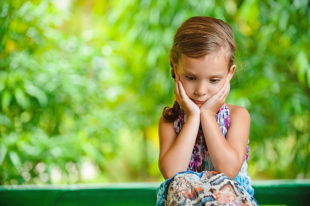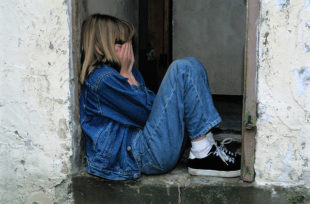What is Complicated Grief and What Can be Done To Help Children Experiencing it?
Christian Counselor Spokane
The overall goal of grief counseling is to help the survivor adapt to the loss of a loved one and be able to adjust to a new reality without him or her.
What is Complicated Grief?
Bereaved individuals with complicated grief experience ongoing difficulty. Complicated Grief (CG) is a bereavement reaction in which acute grief is prolonged, causing distress and interfering with functioning.
 Children may develop symptoms of PTSD (Post-traumatic Stress Disorder) that interfere with their ability to grieve. Child PTSD measures should be administered to determine to what effect the traumatic event has impacted the child. Trauma-Focused Cognitive Behavioral Therapy (TF-CBT) has been successful in reducing PTSD and other difficulties in children from many different cultural backgrounds as well as Complicated Grief Therapy and Cognitive Behavioral Therapy.
Children may develop symptoms of PTSD (Post-traumatic Stress Disorder) that interfere with their ability to grieve. Child PTSD measures should be administered to determine to what effect the traumatic event has impacted the child. Trauma-Focused Cognitive Behavioral Therapy (TF-CBT) has been successful in reducing PTSD and other difficulties in children from many different cultural backgrounds as well as Complicated Grief Therapy and Cognitive Behavioral Therapy.Grief and Bereavement
Everyone experiences grief and loss differently. Bereavement intertwines grief and mourning; however, all as a process. The length of time in bereavement is different for everyone; some process more quickly than others. Furthermore, one’s relationship with the person or the expectancy of the loss of a loved one can be a factor in determining one’s length of time in bereavement.
Bereavement can be viewed as the happening of a loved one’s death or the time during feelings of loss, whereas grief is both the process and emotions that one experiences when one’s significant relationships are interrupted or ended, either through death, divorce, relocation, theft, destruction, or some similar process.
Diminich & Bonanno (2014) express that recent evidence suggests the inability to respond in a contextually appropriate manner earlier in bereavement is predictive of a protracted grief course with poorer adjustment following the loss. As the maintenance of social bonds and support is key in recovery from grief, the construct of emotional context insensitivity has recently been applied to bereavement to help elucidate how emotion dsyregulation may lead to the development of complicated grief.
 According to Jordan & Litz (2014), in Prolonged Grief Disorder, bereavement difficulties persist or grow rather than diminishing with time. The disruption associated with bereavement can trigger various disorders, including not only PGD but also major depression and post-traumatic stress disorder. Cognitive–behavioral grief-targeted interventions were found to be more effective than control conditions (i.e., supportive or other nonspecific therapy, or waitlist) for reducing PGD symptoms (Jordan & Litz, 2014).
According to Jordan & Litz (2014), in Prolonged Grief Disorder, bereavement difficulties persist or grow rather than diminishing with time. The disruption associated with bereavement can trigger various disorders, including not only PGD but also major depression and post-traumatic stress disorder. Cognitive–behavioral grief-targeted interventions were found to be more effective than control conditions (i.e., supportive or other nonspecific therapy, or waitlist) for reducing PGD symptoms (Jordan & Litz, 2014).
Symptoms of Complicated Grief
Bereaved individuals with complicated grief often experience:
- ongoing difficulty comprehending the death
- intense yearning and longing for the person who died
- guilt, anger and bitterness related to the death
- recurrent pangs of painful emotions
- preoccupation with thoughts and images of the deceased
- sense of estrangement and emotional loneliness
- debilitating avoidance behaviors
In most cases, acute grief resolves as the permanence of the loss is comprehended, and this knowledge is integrated into attachment-related long-term memory.
The period of time required might be reduced when death is anticipated, but there is still some period during which the reality of the death is not comprehended. Immediately after its occurrence, perception of a loved one’s death presents information that is incompatible with the working model of that person, largely operating out of awareness.
Worden (2008) discusses specific factors that affect the mourning process and influence the degree of family disruption. These include stages in the family life cycle; roles played by the deceased; power, affection, and communication patterns; and sociocultural factors. Families vary in their ability to express and tolerate feelings. If openly expressed feelings are not tolerated, this may lead to various types of acting-out behavior that serve as grief equivalents.
Although there are various theories about the process of grief, there is emerging consensus regarding what makes someone susceptible to a pathologic grief reaction. Parkes (1998) identified risk factors for a problematic outcome that include traumatic circumstances of the death of a close relative (e.g., sudden, unexpected and untimely deaths, including suicide and murder), multiple deaths, and personal vulnerabilities.
Complicated Grief, which is sometimes labeled as prolonged, unresolved, or traumatic grief, references acute grief that remains persistent and intense and does not transition into integrated grief. CG is a bereavement reaction in which acute grief is prolonged, causing distress and interfering with functioning.
Support After Suicide Loss
Survivors affected by a suicide often face unique challenges that differ from those who have been bereaved by other types of death. In addition to the inevitable grief, sadness, and disbelief typical of all grief, overwhelming guilt, confusion, rejection, shame, and anger are also often prominent.
In light of the above delineated stigma, anger, and guilt associated with suicide loss, reassurance, support, and information provided by family, friends, and, sometimes, clergy is often not available or sufficient for survivors of suicide loss. Treatment should include the best combinations of education, psychotherapy, and pharmacotherapy, often with a focus on depression, guilt, and trauma.
 The rationales for including a supportive person are that individuals experiencing complicated grief often lose a sense of connection with others, which the treatment aims to help restore; an outside perspective on the client and the way that grief is affecting his or her life can be helpful for the therapist; and a friend or family member can facilitate the treatment by understanding what the client is doing and why, and providing support throughout the process, which is often difficult and painful.
The rationales for including a supportive person are that individuals experiencing complicated grief often lose a sense of connection with others, which the treatment aims to help restore; an outside perspective on the client and the way that grief is affecting his or her life can be helpful for the therapist; and a friend or family member can facilitate the treatment by understanding what the client is doing and why, and providing support throughout the process, which is often difficult and painful.
Each experience of grief is unique, complex, and personal, and therapists will tailor treatment to meet the specific needs of each person. For example, a therapist might help the bereaved find different ways to maintain healthy connections with the deceased through memory, reflection, ritual, or dialogue about the deceased.
Traumatic Grief in Children
Not all children who experience the death of someone special under traumatic circumstances develop traumatic grief. However, in some cases, children may develop symptoms of PTSD that interfere with their ability to grieve and to call up comforting memories of the person who died. Traumatic grief may also interfere with everyday activities such as being with friends and doing schoolwork.
PTSD symptoms in children with traumatic grief can include:
✦ Reliving aspects of the person’s death or having intrusive thoughts, for example, experiencing nightmares about the death, not being able to stop thinking about how the person died, imagining how much the person suffered, or imagining rescuing the person and reversing the outcome.
✦ Avoiding reminders of the death or the person who died, for example, by avoiding pictures of the deceased person or news about the military, by not visiting the cemetery, by not wanting to remember or talk about the person, or by feeling emotionally numb.
✦ Increased arousal, being nervous and jumpy or having trouble sleeping, having poor concentration, being irritable or angry, being “on alert,” being easily startled, and developing new fears. In general, if it becomes apparent that children or teens are having very upsetting memories, avoiding activities or feelings, or experiencing physical, emotional, or learning problems, they may be having a traumatic grief reaction.
Current wisdom suggests that post-traumatic stress symptoms should be clinically addressed before the grief work can be done (Worden, 2008). Through psychodynamic psychotherapy, one is able to assist in identifying triggers that amplify symptoms, how to utilize coping mechanisms, and acknowledge feelings and thoughts, thus there is acceptance and then change.
Numerous survivors will exhibit post-traumatic stress symptoms after a traumatic loss. One recovers slowly from these symptoms and the intensity of the symptoms lessen with time.
Common reactions when experiencing symptoms of PTSD include:
- Distressing recollections of the death
- Distressing dreams about the event
- A feeling of reliving the experience
- Feeling numb
- Feeling emotionally detached from other people
- Always feeling “on guard”
- Difficulty working
- Difficulty in social situations
- Difficulty falling or staying asleep
- Irritability or outbursts of anger
- Difficulty concentrating
- Hypervigilance
Therapy for Bereaved Children
Trauma-Focused Cognitive Behavioral Therapy
Trauma-Focused Cognitive Behavioral Therapy (TF-CBT) has been successful in reducing PTSD and other difficulties in children from many different cultural backgrounds. It is a highly collaborative therapy approach in that the therapist, parents, and child all work together to identify common goals and attain them.
TF-CBT supports cultural competency in these ways:
- TF-CBT’s collaborative approach is inherently respectful of cultural, community, and familial differences and preferences.
- Parents are actively engaged in decision making about how the therapy should proceed within the guidelines of the TF-CBT model.
- TF-CBT therapists consider parents as experts regarding their own children, so they prepare and encourage parents to take a leadership role in joint sessions.
Complicated Grief Therapy
Complicated Grief Therapy (CGT) is a relatively new psychotherapy model designed to address symptoms of complicated grief. Drawn from attachment theory and with roots in both interpersonal therapy (IPT) and cognitive-behavioral therapy, CGT includes techniques similar to prolonged exposure (repeatedly telling the story of the death and in vivo exposure activities). The treatment also involves focusing on personal goals and relationships.
In CGT as well as CBT, homework is essential and part of therapy involving individual activities, grief diary, logs, etc. When working with children, art therapy, play therapy, and sand boxes are more effective and age appropriate. Children can also track their feelings by utilizing feeling charts. The charts assist with opening discussion regarding their emotions and how they are dealing with certain feelings.
According to Webb (2010), neuroscientists and professional storytellers elaborate why story works. Deep in one’s cerebral cortex, stories matter. Stories realize and validate the power and ability to find meaning even in the face of grief and adversity.
Stories that carry themes of resilience and wholeness can assist healing during times of loss and grief. Stories weave or reweave lives together. A healing story can clarify and validate, as well as provide new information and insight. A story theme can resonate across races, ages, and circumstances, illuminating connections and lessening isolation and uncertainty (Webb, 2010).
Cognitive therapy aims to change behavior by addressing one’s thoughts or perceptions, particularly those thinking patterns that create distorted or unhelpful views.
Parental warmth includes having a general positive regard for the child, conveying acceptance, expressing affection, fostering open communication, and providing emotional support will empower a child to move through her grief in a less complicated manner.
 When children of any age are not given proper explanations, their powerful imaginations will fill in the blanks with information they have picked up from those around them. Unfortunately, their imaginations often come up with things that are far worse than the simple truth would have been.
When children of any age are not given proper explanations, their powerful imaginations will fill in the blanks with information they have picked up from those around them. Unfortunately, their imaginations often come up with things that are far worse than the simple truth would have been.
Children need avenues for safe expression of feelings that may include fear, sadness, guilt, and anger. Children’s play is their “work.” Provide a child-friendly environment where a child may choose the avenue best suited to his or her self-expression. For some children, it may be drawing or writing; for others, it may be puppetry, music, or physical activity.
The most common areas of focus include what to expect behaviorally, cognitively, emotionally, and physically; how to cope with stress, grief, trauma, and loss; normal versus abnormal grief; and concerns to watch for. When a traumatic incident occurs, its impact can affect children in a variety of ways. Reasons to be concerned would be if academic or social functioning becomes impaired or if a child or adolescent is experiencing several symptoms, particularly if some time has gone by since the traumatic event occurred.
Conclusion
Grief is universal. Everyone, at some point in their lives, will experience grief. Complicated grief can be difficult to overcome for anyone, especially a child who is not receiving the support and care of loved ones and professionals. Losing a loved one impacts one’s entire life and everything around them. When a child loses someone they love, he or she often cannot communicate those feelings, emotions, and thoughts. It is difficult for them to process the loss and what it really means.
Utilizing assessments and measurements to identify the severity of symptoms in a child after a traumatic loss allows a professional to provide the child with an appropriate diagnosis, care, and treatment. As a counselor, I have found that everyone experiences grief differently and that there isn’t a timeline; however, through the Lord’s grace, one can overcome the unbearable. As a Christian counselor and as a person who has experienced grief and loss, we can walk the walk together in the Lord’s grace.
References
Diminich, E. D., & Bonanno, G. A. (2014). Faces, feelings, words: Divergence across channels of emotional responding in complicated grief. Journal Of Abnormal Psychology, 123(2), 350-361. doi:10.1037/a0036398
Haine, R. A., Ayers, T. S., Sandler, I. N., & Wolchik, S. A. (2008). Evidence-Based Practices for
Parentally Bereaved Children and Their Families. Professional Psychology, Research and Practice, 39(2), 113–121. doi:10.1037/0735-7028.39.2.113
Joiner, T. J., Catanzaro, S. J., & Laurent, J. (1996). Tripartite structure of positive and negative affect, depression, and anxiety in child and adolescent psychiatric inpatients. Journal of Abnormal Psychology, 105(3), 401-409. doi:10.1037/0021-843X.105.3.401
Jordan, A. H., & Litz, B. T. (2014). Prolonged grief disorder: Diagnostic, assessment, and treatment considerations. Professional Psychology: Research And Practice, 45(3), 180-187. doi:10.1037/a0036836
Shear, K., M.D., Monk, T., PhD., Houck, P., M.Stat, Melhem, N., PhD., Frank, E., PhD., Reynolds, C., M.D., & Sillowash, R. (2007). An attachment-based model of complicated grief including the role of avoidance. European Archives of Psychiatry and Clinical Neuroscience, 257(8), 453-61. doi:http://dx.doi.org/10.1007/s00406-007-0745-z
Tal Young, I., Iglewicz, A., Glorioso, D., Lanouette, N., Seay, K., Ilapakurti, M., & Zisook, S. (2012). Suicide bereavement and complicated grief. Dialogues in Clinical Neuroscience, 14(2), 177–186.
Tishler, C. L., Reiss, N. S. and Rhodes, A. R. (2007). Suicidal behavior in children younger than twelve: A diagnostic challenge for emergency department personnel. Academic Emergency Medicine, 14, 810–818. doi: 10.1111/j.1553-2712.2007.tb02357.x
Webb, N. (2011). Social Work Practice with Children (3rd Edition). New York, NY, USA: Guilford Press. Retrieved from http://www.ebrary.com
Webb, N. B. (Ed.) (2010). Helping bereaved children (3rd ed.). New York, NY: Guilford. ISBN: 9781606235973.
Wetherell, J. L. (2012). Complicated grief therapy as a new treatment approach. Dialogues in Clinical Neuroscience, 14(2), 159–166.
Worden, J. W. (2008). Grief counseling and grief therapy: A handbook for the mental health practitioner (4th Edition). New York, NY. Springer Publishing Company
http://www.allianceofhope.org/survivor_experience/2011/08/trauma-post-traumatic-stress.html
http://www.ptsd.va.gov/professional/newsletters/research-quarterly/V13N1.pdf
http://www.goodtherapy.org/therapy-for-grief.html#
http://www.goodtherapy.org/blog/the-death-of-a-parent-healing-childrens-grief
http://psychcentral.com/lib/children-and-grief/
http://www.ptsd.va.gov/professional/assessment/child/child-measures.asp
http://www.nctsnet.org/nctsn_assets/pdfs/TF-CBT_Implementation_Manual.pdf
https://www.childwelfare.gov/pubpdfs/trauma.pdf
http://www.nctsn.org/sites/default/files/assets/pdfs/military_grief_medical.pdf
https://www.mentalhelp.net/articles/grief-bereavement-issues/
Photos
“Sad,” courtesy of Michelle Lamberti, Flickr Creative Commons 2.0; “Pieces of My Heart,” courtesy of Son of Groucho, Flickr Creative Commons 2.0; “Drawing in the Sand,” courtesy of Jakob Owens, unsplash.com, CC0 License; “Tears,” courtesy of rubberduck1951, pixabay.com, CC0 License





